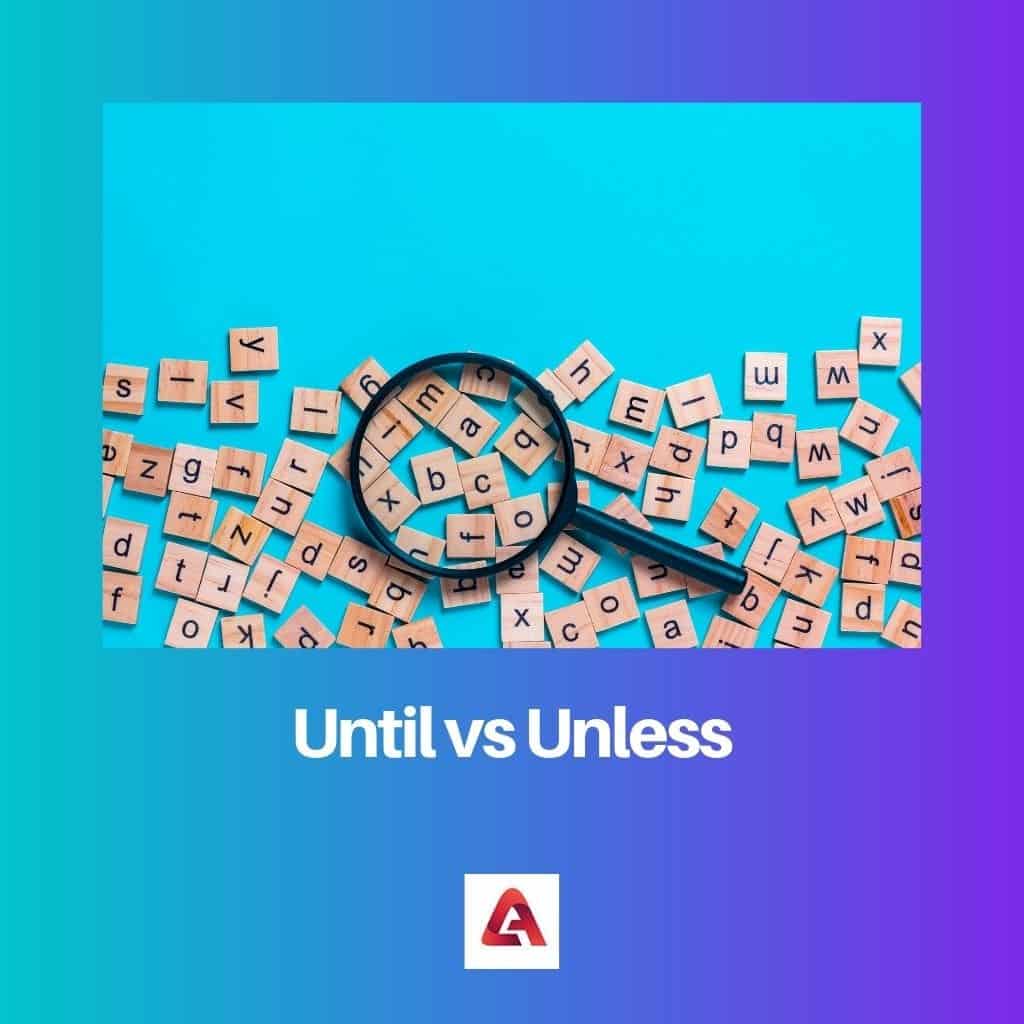The English language has a set of principles and rules which deals with word and sentence structure; it is called English Grammar.
Key Takeaways
- “Until” indicates the end of a period or event, while “unless” introduces a condition that must be met for a statement to be true.
- “Until” can be used with both time and events, whereas “unless” is used with conditions and hypothetical situations.
- “Until” is a preposition or conjunction that establishes a time frame, while “unless” is a conjunction that sets a conditional context.
Until vs Unless
“Until” refers to a time frame that will end at a certain point, and is used with positive statements and to indicate a time frame that will end at a certain point. “Unless” implies a condition that must be met in order for something else to happen and is used with negative statements.

Until and Unless are subordinating conjunctions that are used to connect sentences in the English language. Until refers to the time before an event or incident could happen; it signifies the time with the condition.
Comparison Table
| Parameter of Comparison | Until | Unless |
|---|---|---|
| Function | The word ‘Until’ is used to show the reference of time in a sentence for a specific task to be completed. | The word ‘Unless’ references a circumstance in a sentence for a specific task to be completed. |
| Meaning | ‘Until’ means up to a specific time limit. | ‘Unless’ means up to a particular situation. |
| Conditional Connotation | ‘Until’ sets a time factor to do something else. | ‘Unless’ sets the condition to choose one over another. |
| Word/Phrase replacement | ‘Until’ replaces the phrase ‘Till the time.’ | ‘Unless’ replaces the words ‘If’ and ‘Except.’ |
| Sequential Connotation | As ‘Until’ refers to the time factor, the activity shall be a sequence after that. | ‘Unless’ shall not guarantee sequence in the happenings. |
When to Use Until?
Until it is a Conjunction, it mainly refers to time as a context to set the sentence condition. It is also used in sentences to define the situation’s length.
For E.g.
- We were on vacation until next week
- Taniya studied until 11 clocks
Until means up to the time or till the time. To show one’s mission to finish the job or task even if things make it challenging.
The word Until derives from the old English word ‘END’ first used in the 13th century.
Until it is used to show a particular time and is already considered a negative form of connection, not using it is inappropriate. Avoid using Not with Until.
For E.g.
- Please don’t go anywhere until I come.
- Until I finish watching this show, don’t change the channel
Until it shows the action or continues until demand is met. Until and till have the same meaning, where till is used commonly during conversation and not in formal writing. Until it is used in legal writing.
Until as Preposition – Up to the time or till the time
For E.g.
- Don’t switch on the TV until I finish work.
- Reena can’t leave until the rain stops.
Until or till are used when we talk about something which starts and ends.
For E.g.
- I played soccer from 7 PM till 9 PM
- The trains are cancelled from today until next week.
Until cannot be used when we talk something about that will happen before a particular time or deadline.
William will finish his work by 6 PM. In sentences like these, ‘Until’ cannot be used as it does not set a condition. Until is a preposition and conjunction, so it cannot be used as a noun or verb.

When to Use Unless?
Unless it mentions a clause for a particular event to happen. Except if they are the same connection as Unless.
Unless is derived from the word ‘onlesse’ later, it changed to Unless.
Unless it means under the circumstance, it allows choosing one thing over another. It is a condition word as it provides the option of choosing and doing between the two things.
For E.g.
- You cannot wear that dress unless you wash it
- Unless you give me the money, we cannot go shopping.
Unless it is a conditional word, it makes the situation or works possible unless it is a conjunction that joins or pairs two sentences.
Unless – When Something is actual or possible in a particular situation
For E.g.
- You cannot score good marks unless you put effort
- Unless you finish homework, you can’t sleep.
Unless – to mention the circumstances, which may not be possible
For E.g.
- She cannot travel to Paris unless she makes a passport.
- Unless the rain stop, we cannot go out.
Unless followed by the present and past tense, it is used instead of If and Except unless it can be used anywhere in the sentences.
Main Differences Between Until and Unless
- The main difference between Until and Unless is the condition it sets in the sentence until sets a time clause, whereas unless sets the situational clause to the ruling.
- The meaning of the words also gives a clear contextual preference of the words; until means up to a certain extent of time, While unless means up to a particular situation.

The explanation of when to use ‘Unless’ is very clear and precise, I enjoyed reading it.
This post is an excellent resource for anyone looking to grasp the proper usage of ‘Until’ and ‘Unless’.
The post provides a clear distinction between ‘Until’ and ‘Unless’, making it easier to understand. Well done!
I didn’t know the word ‘Until’ was derived from ‘END’, that’s an interesting point!
This is essential for anyone trying to improve their grammar, accurate and well explained.
I disagree, the discussion about ‘Until’ and ‘Unless’ is quite basic and could be more thorough.
It’s great to see such a detailed comparison, it really helped me understand the differences!
This post is a breath of fresh air, finally, an in-depth look at ‘Until’ and ‘Unless’.
Very informative post! I appreciate the detailed comparison between ‘until’ and ‘unless’.
I appreciate the historical context provided for the words ‘Until’ and ‘Unless’. Good work!